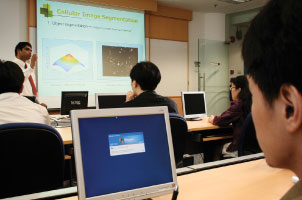
SMA’s primary goal is to be a centre of excellence for graduate education and research which provides technologically advanced distance learning facilities for students
Intensive computation for simulation and optimisation has become an essential activity in both the design and operation of engineered systems. In applications as diverse as aircraft design, materials design and micro-machined device design optimisation, engineers need computationally-tractable modelling systems that predict and optimise system performance in a reliable and timely manner. Effective computation allows for shorter design cycle times, better product quality and improved functionality. As the systems grow more complex, the overall economic impact of these tools can reach trillions of dollars. The next decade will experience an explosive growth in the demand for accurate and reliable numerical simulation and optimisation of engineered systems, requiring CE to become even more multidisciplinary than in the past, for researchers and professionals in computational engineering will need a strong background in sophisticated numerical simulation and optimisation as well as the ability to marry application formulation to numerical methodology. The ever accelerating rate at which new technology becomes available requires that computational engineers be discipline-flexible in their skills, for while numerical methodology is of growing importance, a major demand still lies in providing tools for overcoming the manufacturing yield issues that have hindered Bio-MEMS commercialisation.
The programme combines applied general methodology courses, discipline-specific electives and industrial experience in a manner that concurrently trains professionals for industry while preparing doctoral students to participate in the flagship and inter-university research projects. The CE programme is focused on educating professionals who will model, simulate, optimise and design the important engineered systems of the next decade.
